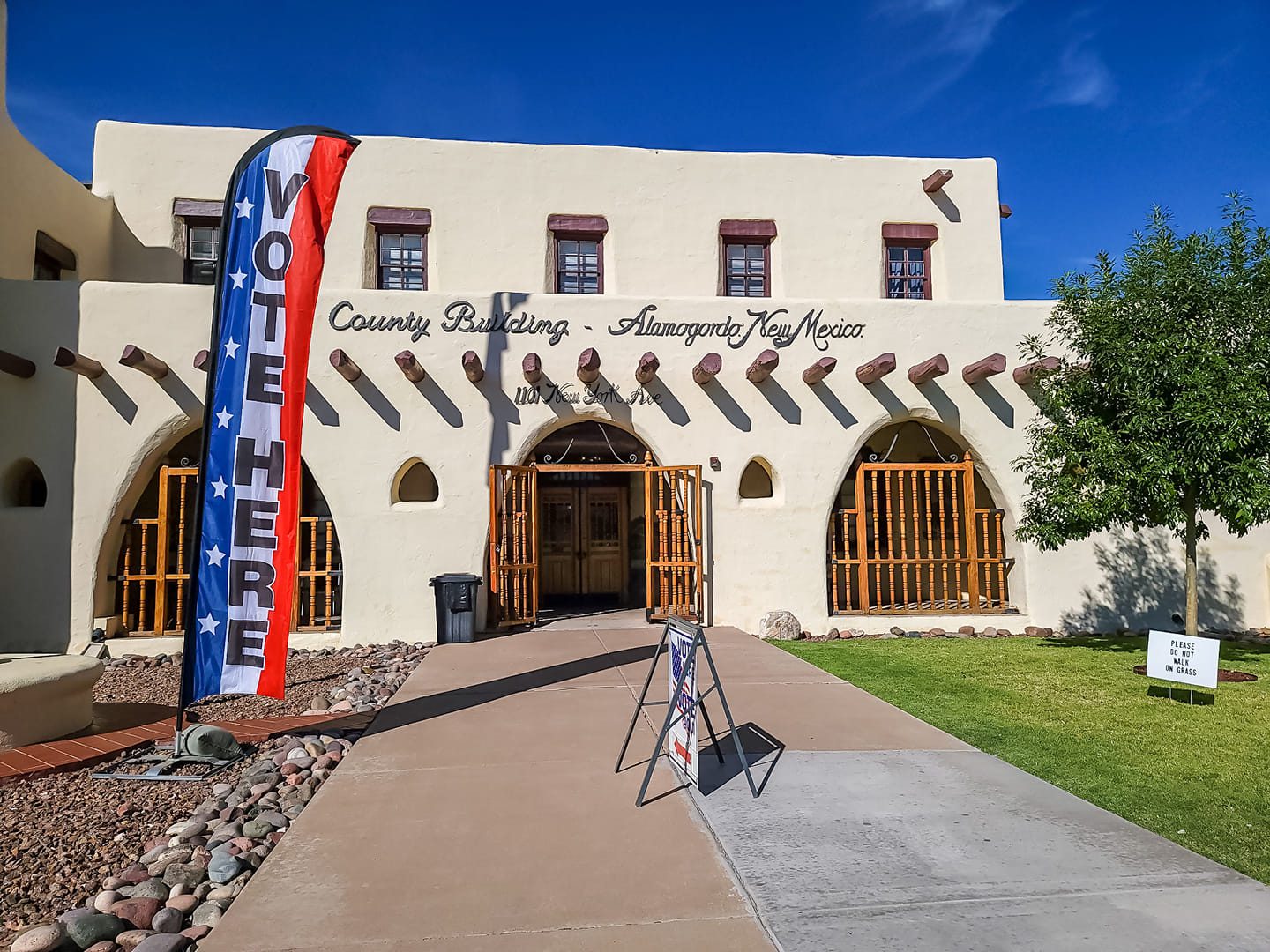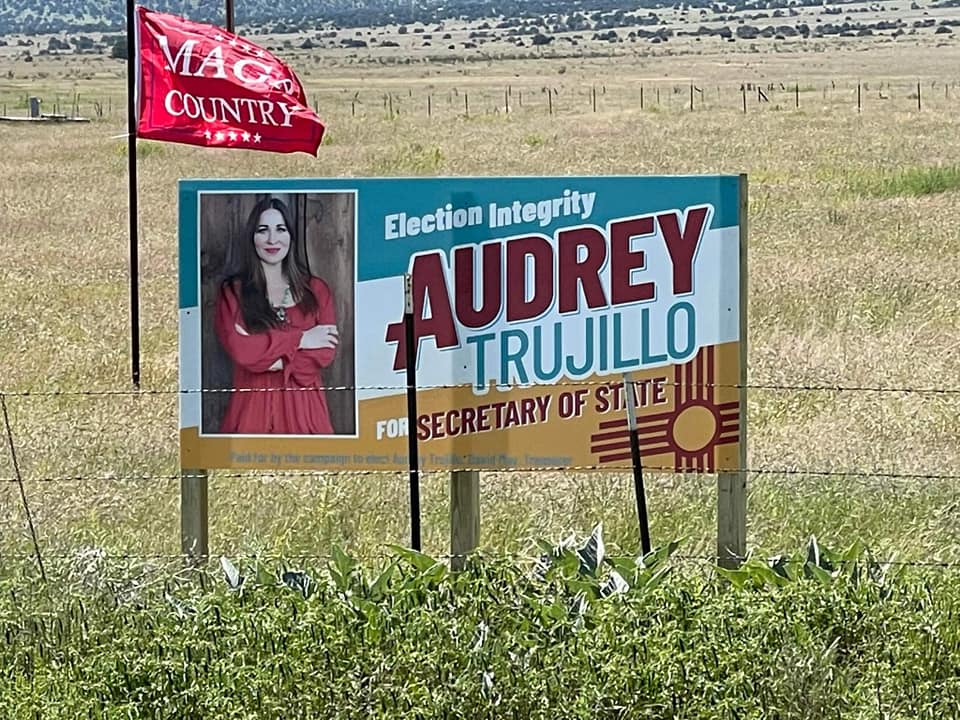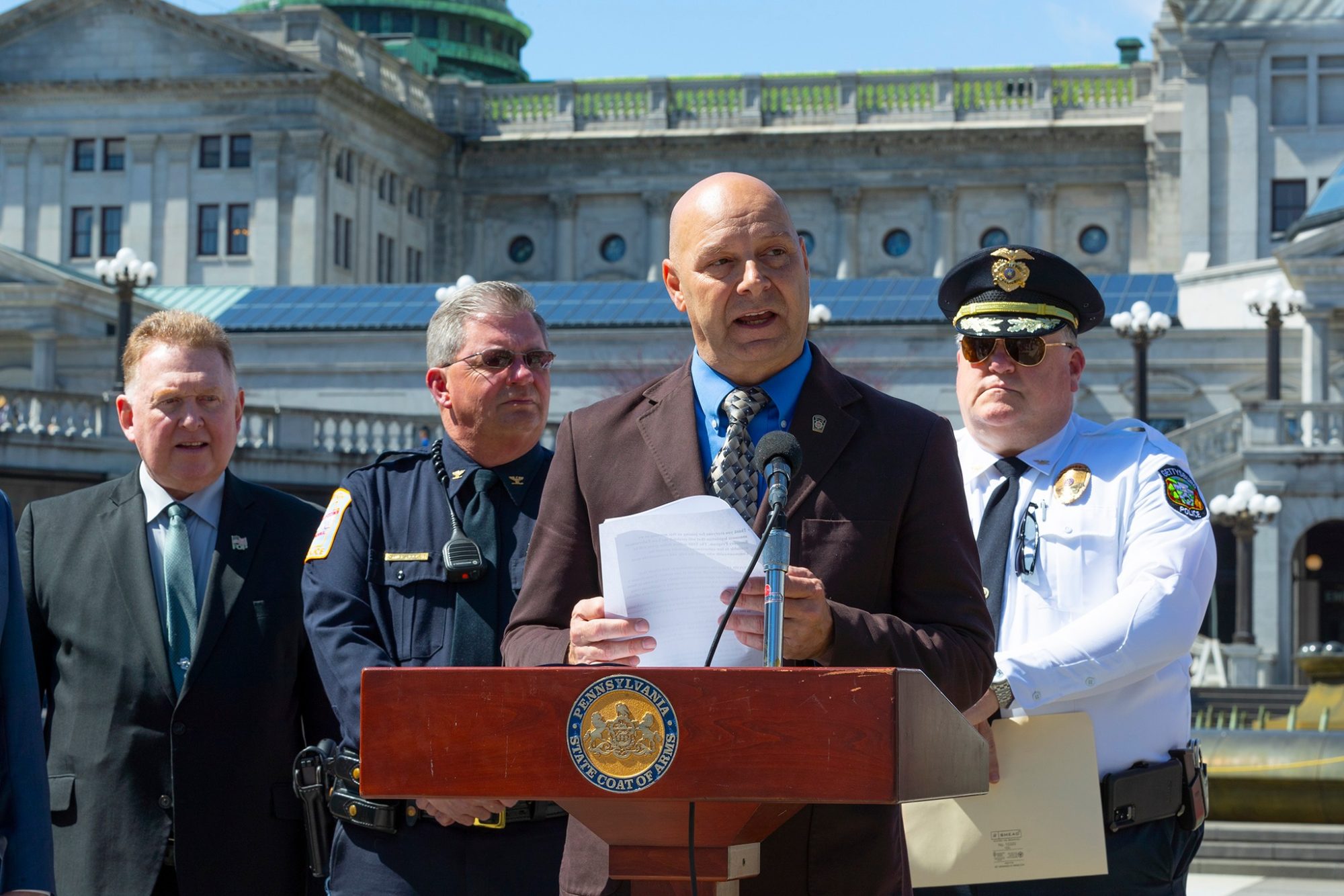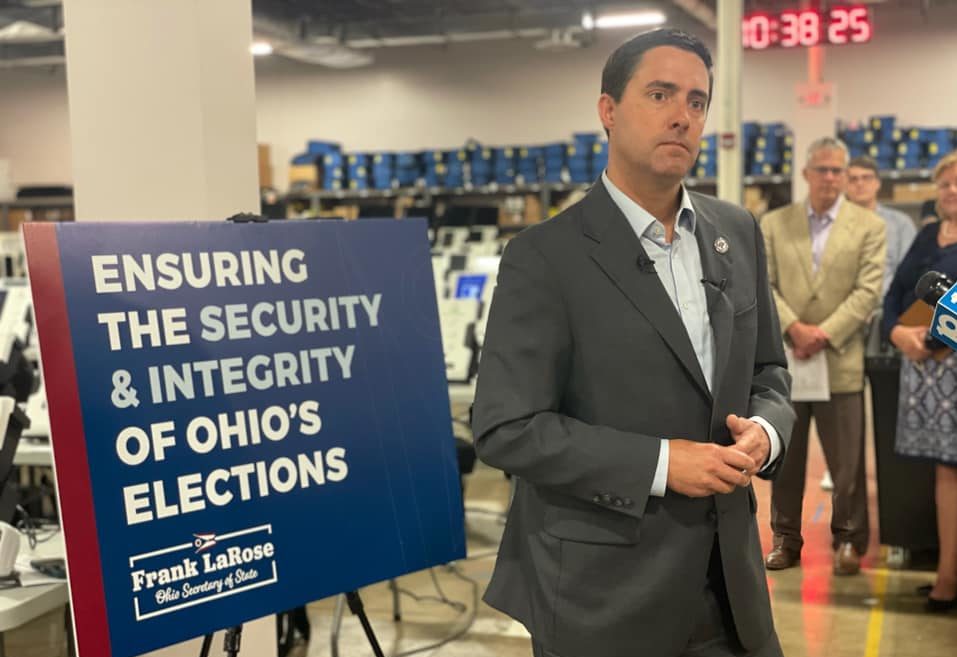A New Mexico County Went To War With Voting Machines. It May Gain a Powerful Ally in November.
Conspiracy theorists are pushing to upend New Mexico’s voting systems. State officials have stood up to them but the secretary of state race could change the balance of power.
Paul McLeod | October 25, 2022


The lawyer was clear: what the commissioners of Otero County, New Mexico were thinking of doing this fall was against the law. If they followed through they could be removed from office and could face criminal charges.
But Commissioner Couy Griffin was adamant. As the founder of Cowboys For Trump, he was steeped in election conspiracy theories that sprung up after Trump’s loss in 2020. At an August 11 meeting Griffin pushed for their county to eliminate election ballot drop boxes and voting machines, which he argued could be tools for voter fraud. He also wanted to sue Democratic Secretary of State Maggie Toulouse Oliver, who months earlier had gone to court to force them to certify primary election results that Griffin didn’t trust.
The other two commissioners, also Republicans, weren’t buying it. As their county lawyer RB Nichols made clear, the use of voting machines and drop boxes is dictated by state law. “It won’t matter what we vote, we have no authority to do anything,” said Gerald Matherly. Fellow Commissioner Vickie Marquardt agreed, saying “this is out of our purview.”
Hours later, after a raucous community meeting that included shouting, allegations of fraud, and calls for resignations, Griffin prevailed. The commission voted 2-1 to do away with drop boxes and voting machines, as well as to sue the secretary of state.
These moves kicked off an intra-party showdown between Republican elected officials following the rule of law and others who are trying to overturn the system as they pursue election conspiracies in a county that voted 62 percent for Trump in 2020.
They offer a preview for the types of fights that could ensue as more election deniers seek positions of electoral power in New Mexico. So far those on the side of following the law are winning, but that is only true as long as key positions are filled by people willing to resist pressure from constituents who have bought into Trump’s Big Lie conspiracies.
Otero County Clerk Robyn Holmes, also a Republican, is refusing to comply with the commission’s directive. Holmes says she has the power to decide how local elections are run and the voting machines and drop boxes will stay.
“They cannot create laws. I took an oath of office to follow the law and that’s what I’m going to do,” Holmes told Bolts.
Holmes has the benefit of knowing that in her showdown with the commission, she has Toulouse Oliver backing her up. Back in June the Otero Commission refused to certify primary election results—despite one commissioner, Matherly, being on the ballot and needing his own candidacy to be certified. The commission had no discretion to refuse to certify results under state law, and Toulouse Oliver went to court to force the commission to reverse course. The state supreme court stepped in and sided with her.
Asked if having an election denier as secretary of state would change the dynamic and make her job more difficult, Holmes said “I think absolutely it would.”
New Mexico is one of several states this fall where an election denier is vying to take over the secretary of state position. The Republican challenger to Toulouse Oliver is Audrey Trujillo, a pro-Trump candidate who rejected the results of the 2020 presidential election and called Biden’s victory a “coup.”
Trujillo has endorsed various conspiracy theories and claimed that school shootings were conducted by “the deep state” in order “to push an agenda” to take away guns. She is campaigning heavily on conspiracies about election security, saying that current New Mexico leaders weaponized voter laws and the Covid-19 pandemic to “secure their elections for at least 100 years.” Similar to the movement in Otero County, she claims voting machines manipulated election results and has called for hand counting ballots. In June, Trujillo publicly urged the state’s county commissioners to not certify their primary election results without a hand recount and encouraged them to stop using voting machines from Dominion Voting Systems.
“I just want to improve the system we have in place; I’m not here to recreate the wheel,” Trujillo told the Las Cruces Sun News in September. “But if there are questions on those machines, we’re going to do our damnedest to do our research and see how we can do it a better way and an easier way.”
A secretary of state sympathetic to conspiracy theorists could embolden controversies that are already bubbling at the local level, either by sitting back and doing nothing when local officials refuse to certify results or, more dramatically, themself refusing to certify the lists of candidates running for state office. They could also disrupt other key roles that the office plays in overseeing elections, with responsibilities ranging from producing election rules to investigating complaints of lawbreaking.
New Mexicans are also voting on two supreme court elections this year. The high court is sure to remain in Democratic hands, but Republicans could narrow their deficit and at least one of the GOP candidates has echoed conspiracies about election administration.
County commission meetings across the state are regularly beset by residents expressing unfounded conspiracy theories about how drop boxes and voting machines are tied to election fraud. Occasionally commissioners take their side.
“It’s the overall system that comes into question,”one exasperated county commissioner told the AP. “So how do you challenge that, how do you get your answers?”
The source of many of these theories is a husband and wife couple, David and Erin Clements, who have traveled all across the country to evangelize their brand of election denialism. They happen to be from New Mexico, one county over from Otero. In their home state they have dubbed themselves the New Mexico Audit Force and released an extensive report full of voter fraud allegations that fall apart under scrutiny.
Neither have a background in elections. Erin Clements was a civil engineer. David Clements was a business professor at New Mexico State University who was fired after refusing to comply with the school’s Covid safety policies on masking or vaccinations. He amassed a large following online and raised over $300,000 from a crowdfunding campaign.
The couple travels from state to state urging people to show up at their local government meetings to demand voting machines and drop boxes be removed. They have been particularly active in New Mexico—and it’s working. County clerks have been receiving steady pressure to dismantle the machinery of elections.
“It’s consistent, it is unrelenting, it is sometimes aggressive. I’ve had to report a couple of threats to the FBI,” said Doña Ana County clerk Amanda López Askin. “I hate to say it but it’s part of the job at this point, sadly.”
She counted 141 Freedom of Information Act requests from election deniers, including requests for in-person tours to audit election machinery. “They have really weaponized public records requests. If I let them they would incapacitate my office to the point where we would not be able to run an election,” said López Askin.


In Otero County, this dynamic exploded into a chaotic community meeting the evening of August 11.
The Clementses were welcomed onstage to discuss their report. When County Attorney RB Nichols reiterated that the commission had no legal authority to do away with voting machines or ballot drop boxes, David Clements lambasted the local officials for cowardice.
“It’s tyranny. And you don’t help them. You don’t help us. You don’t fight. You just do whatever the secretary of state tells you to,” he said.
Supporters in the public gallery cheered along. Nichols was insistent, saying he would not go along with the Clementses demands that the county sue the secretary of state. “I’m not going to file a frivolous lawsuit, David. I have to have a good-faith basis.”
When an audience member called for following the law, Clements said that Nazis under the direction of Hitler were also following the law. When commissioner Matherly discussed downgrading the motion to a request so that they would not risk going to jail, Clements shamed him. “And why are you scared of going to jail?”
The Clementses, along with commissioner Griffin, waged a steady pressure campaign. Griffin argued that the commission should sue Toulouse Oliver for forcing them to certify primary results that he claimed were later proven to be fraudulent.
The basis for Griffin’s fraud claim is that a hand recount changed the results of one primary race by three votes. Clerk Holmes explained that three people filled out their ballot incorrectly and that the machine would have notified them of their mistake and directed them to get a new ballot, but sometimes people do not want to start over and submit it anyway. She said during the hand recount election workers determined that voter intention of those three ballots were clear enough to be counted.
Despite this explanation, Griffin continued to insist that the discrepancy was proof of voter fraud.
“If there were three votes that weren’t counted in that race, how many other races were the same?” he said. “And how does that affect the big picture, OK? Again, I’m just fighting for the truth up here and I see it pretty clearly right now.”
David Clements jumped up to a microphone to shout down Holmes. “You need to resign,” he said. “Disgusting how you fight the people.”
Griffin and the Clementses won the day, convincing commissioner Marquardt to vote for removing drop boxes and voting machines, as well as for suing the secretary of state.
Returning to hand counting ballots would turn the clock back on decades of advances in voting infrastructure. In modern times, hand counting is generally only performed in small jurisdictions dealing with a few hundred votes. In Otero County, which has 67,000 people, a full hand count would be enormously time consuming and could delay election results by weeks.
While many people see voting machines as mysterious and consider hand-counting ballots to be the gold standard, research has consistently shown that machines are more accurate than people. One 2012 study on post-election audits published in the Election Law Journal found that when humans hand count complex paper ballots they can easily count ballots multiple times, skip over ballots, or misread a voter’s intent.
“Hand counting indisputably takes more time, more money and is less accurate,” said Victoria Bassetti, senior advisor to the States United Democracy Center.
America’s fervor for democracy has created a democratic system not suited to be tallied by humans. Ballots in other developed nations may feature a single question. American ballots can run multiple pages as people vote on governors, secretaries of state, judges, sheriffs, comptrollers and so on. That leads to a lot of tedious counting, a lot of concentration required, and a lot of opportunity for slip-ups.
“Reading ballots is a repetitive and boring task and humans lose focus. They just do,” said Bassetti.
When using voting machines, states build in a series of checks and balances to ensure accuracy. The specifics vary by jurisdiction but typically include pre-election certification and accuracy testing, post-election statistical and risk-limiting audits, plus optional or automatic recounts in close races.
The machines have limitations—they can’t interpret someone changing their vote by crossing out a box or writing in the margins—but they can tally in hours what would take humans days or weeks to count.
In Otero County, the August 11 meeting would prove to be the high water mark of the rebellion. Griffin would end up being removed from office. He had attended the January 6 riots at the Capitol and was later convicted of breaching restricted Capitol grounds. In September, he became the first elected official in over 150 years to be disqualified from office under Section 3 of the 14th Amendment, which bars anyone involved in an insurrection against the United States from serving in public office.
Holmes has ignored the commission’s directives. Early voting has already started for this fall’s elections, with voting machines and secure ballot drop boxes currently set to be part of the system.
So far no lawsuit has been filed by RB Nichols, the county attorney who publicly declared he would not file a lawsuit he knew to be in bad faith.
The most recent polling shows incumbent secretary of state Toulouse Oliver with a healthy lead over challenger Trujillo. Since Griffin was removed as a commissioner, the drop box and voting machine issues he was crusading for have not made it back into discussion. Instead, commission meetings have returned to focusing on typical local governance issues.
But the election conspiracies have not died down. In rural Torrance County, county commissioners approved a hand recount of primary election results and recently tried to oust the county clerk over her handling of voting machine certification.
López Askin, the Doña Ana County clerk, is one of the most vocal clerks in the state in responding to election conspiracy theories, which she finds are regularly brought up at community meetings. She recalled one resident at a meeting shaking with anger and demanding officials look into fraud as she held up the Clementses self-described audit.
López Askin said that she and her colleagues try to explain the multiple levels of security built into the system—certification of machines, accuracy tests, recounts in close races, post-election audits of results—but ultimately she fears people will opt out of the democratic process because they believe the people telling them it’s a sham.
“These folks get up there and they are fully angry and emotional. They believe it. I don’t know if there’s anything I could say at this point that could continue otherwise,” she said. “So I actually feel mostly compassion for them.”
Sign up and stay up-to-date
Support us
Bolts is a non-profit newsroom that relies on donations, and it takes resources to produce this work. If you appreciate our value, become a monthly donor or make a contribution.




